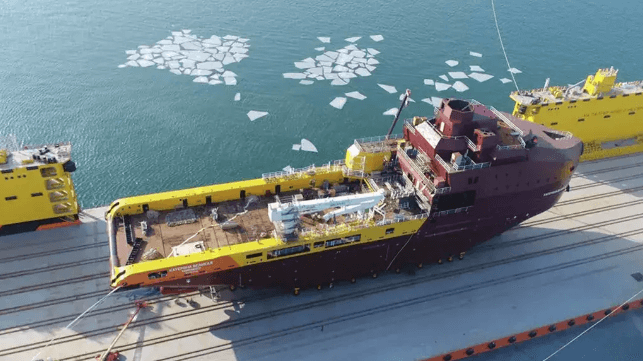One Dead in Fire Aboard Russian Icebreaker

In the early hours of Monday morning, Russia’s ice-class supply ship Katerina Velikaya caught fire at Dalzavod shipyard in Vladivostok, where it is under construction. According to a report by the Far Eastern Transport Prosecutor’s Office, one person died and three others were hospitalized with serious injuries.
By the time the firefighters were arriving, the smoke had filled the holds of the vessel and could be seen billowing from the stern. The region’s emergency fire services also reported that the propulsion equipment room was damaged by the inferno. The cause of the fire is currently under investigation.
The fire incident has dealt a major blow to the delivery of the special icebreaker, which was already long overdue. Katerina Velikaya is the first of four multifunctional ice-class supply vessels ordered by the Russian oil producer Rosneft at Zvezda Shipbuilding complex in Bolshoy Kamen. The vessel was ordered in September 2015, laid down in September 2017 in presence of the Russian President Vladimir Putin and launched in December 2020. Initially, the ice-breaker was scheduled to enter service in 2019.
The 106-meter ice-breaker had been towed to Vladivostok for outfitting, mooring trials and preparation for sea trials.
The vessel class is designed to break ice up to 1.5 meters thick, and has a crew capacity of 49. Rosneft plans to use this series of ice-breakers for supply of offshore drilling platforms, provision of icebreaking assistance, towing vessels and transporting containers on the main deck.
Ukrainian Spy Agency Claims it Lit a Fire on a Russian Corvette

Ukraine's military intelligence directorate, the GUR, has claimed responsibility for a serious fire aboard a Russian warship at the port of Kaliningrad, 800 miles away from the main conflict in the Black Sea.
In a social media statement, the GUR claimed that a fire broke out aboard the Buyan-M class corvette Serpukhov at Kaliningrad, the Russian exclave and naval base wedged between Poland and Lithuania. Russian sources have not confirmed the attack.
GUR provided what appeared to be a schematic of the vessel's internal spaces, and a brief video of an incendiary device going off. The agency said that the Serpukhov sustained substantial damage from the fire. "Its means of communication and automation were completely destroyed," the GUR claimed.
Serpukhov is the eighth vessel in the Buyan class and the fifth of the upgraded Buyan-M variant. These ships are designed for coastal operations and are heavily armed for their size, carrying up to eight Kalibr or Oniks antiship missiles and up to eight surface-to-air missiles.
The GUR's claim could not be confirmed, but it would be consistent with the group's recent emphasis on deep strikes behind the Russian lines. The agency's drones have hit Russian oil refineries up to 750 miles away from Ukraine's borders, and have taken approximately 14 percent of Russia's refining capacity offline. The latest strike - a claimed attack on a product pipeline - allegedly disabled all product tanker loadings at the occupied port of Azov.
The GUR has also mounted a successful campaign against the Russian Black Sea Fleet, damaging or destroying a claimed one-third of its force and confining the rest to the relative safety of Novorossiysk.
Serpukhov's sister ship Velykyi Ustyug was likely damaged by a Ukrainian drone early in the invasion. In June 2022 the Ustyug was photographed in tow to a shipyard, showing signs of fragmentation damage along her port side.
No comments:
Post a Comment